Online Privacy Concerns and Ethical Considerations in the Digital Age
VerifiedAdded on 2022/11/17
|8
|2221
|67
Essay
AI Summary
This essay provides a comprehensive analysis of online privacy in the digital age, covering various aspects such as data security, ethical considerations, and relevant regulations. It begins by highlighting the increasing importance of digital privacy in contemporary society, where most activities are conducted online, and emphasizes the need for protecting user data and information. The essay then explores the legal frameworks in place, particularly in Australia, including the Privacy Act 1988 and the impact of the GDPR, and discusses the ethical responsibilities of organizations in handling data. It delves into various privacy issues, such as data breaches, malware, and phishing, and examines how companies like Facebook, Google, and Apple approach user privacy. The essay also highlights the importance of individual responsibility in protecting personal data and concludes by reiterating the necessity of online privacy and the role of ethics in IT and other digital services. The essay provides a clear and well-structured overview of the challenges and solutions related to online privacy, emphasizing the importance of a collaborative approach between users, vendors, and regulatory bodies.
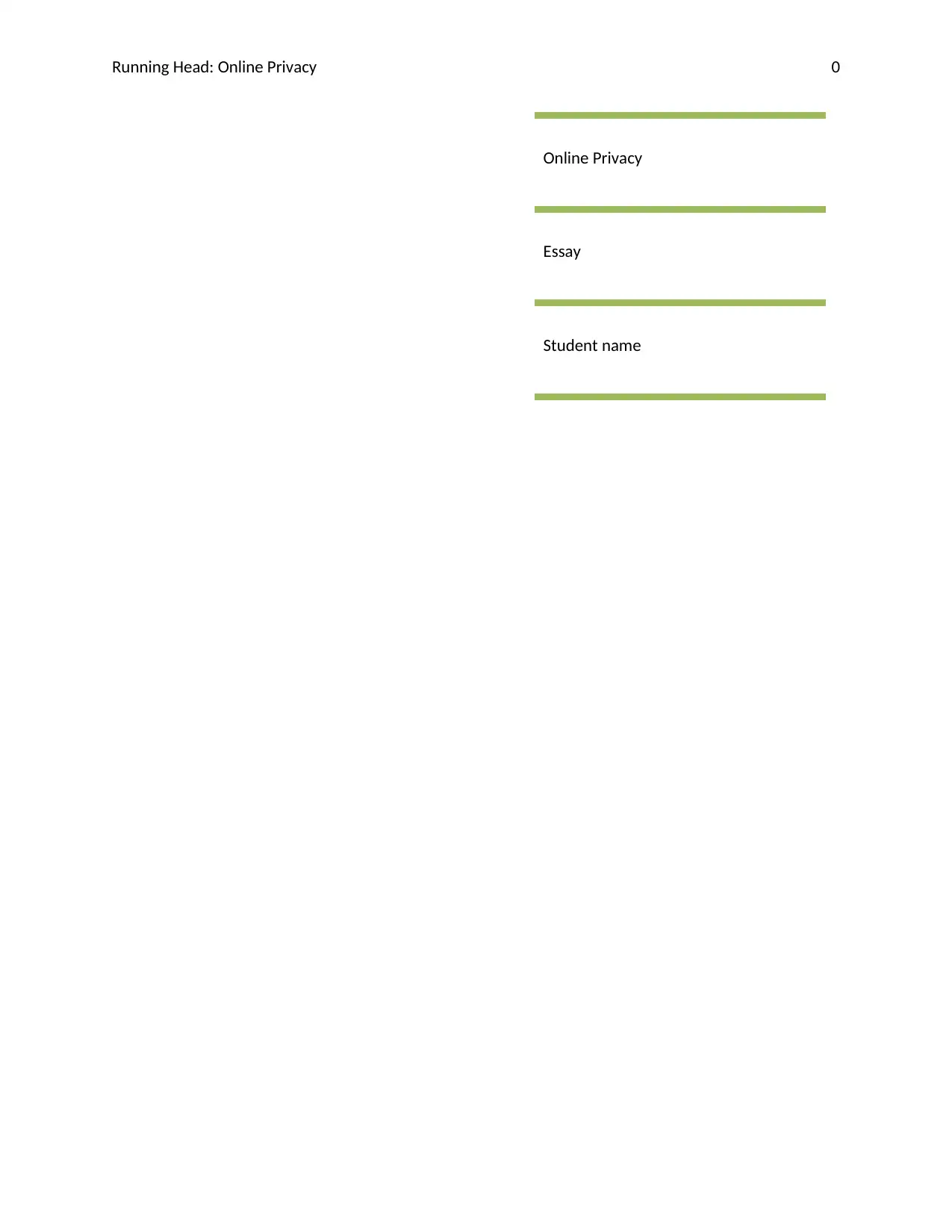
Running Head: Online Privacy 0
Online Privacy
Essay
Student name
Online Privacy
Essay
Student name
Paraphrase This Document
Need a fresh take? Get an instant paraphrase of this document with our AI Paraphraser
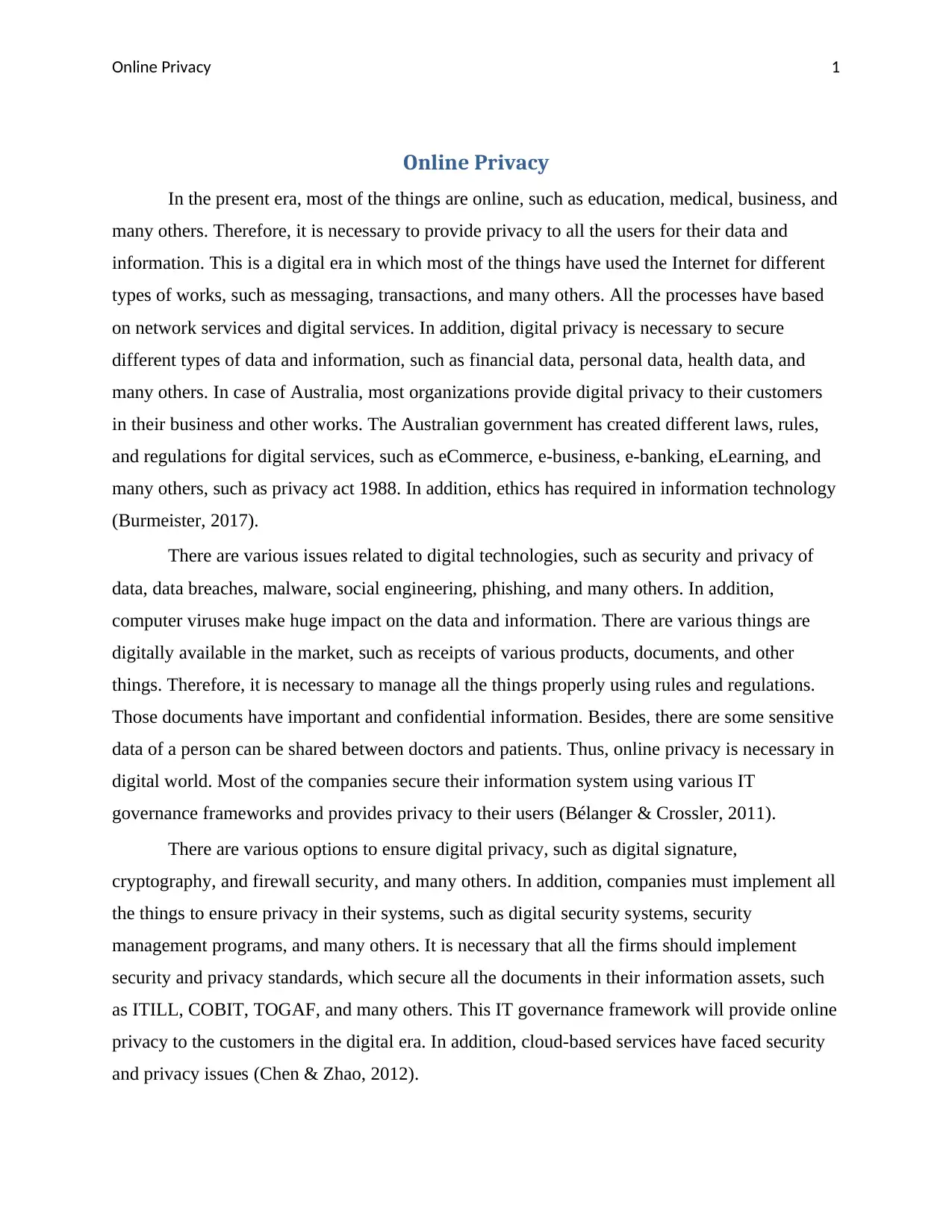
Online Privacy 1
Online Privacy
In the present era, most of the things are online, such as education, medical, business, and
many others. Therefore, it is necessary to provide privacy to all the users for their data and
information. This is a digital era in which most of the things have used the Internet for different
types of works, such as messaging, transactions, and many others. All the processes have based
on network services and digital services. In addition, digital privacy is necessary to secure
different types of data and information, such as financial data, personal data, health data, and
many others. In case of Australia, most organizations provide digital privacy to their customers
in their business and other works. The Australian government has created different laws, rules,
and regulations for digital services, such as eCommerce, e-business, e-banking, eLearning, and
many others, such as privacy act 1988. In addition, ethics has required in information technology
(Burmeister, 2017).
There are various issues related to digital technologies, such as security and privacy of
data, data breaches, malware, social engineering, phishing, and many others. In addition,
computer viruses make huge impact on the data and information. There are various things are
digitally available in the market, such as receipts of various products, documents, and other
things. Therefore, it is necessary to manage all the things properly using rules and regulations.
Those documents have important and confidential information. Besides, there are some sensitive
data of a person can be shared between doctors and patients. Thus, online privacy is necessary in
digital world. Most of the companies secure their information system using various IT
governance frameworks and provides privacy to their users (Bélanger & Crossler, 2011).
There are various options to ensure digital privacy, such as digital signature,
cryptography, and firewall security, and many others. In addition, companies must implement all
the things to ensure privacy in their systems, such as digital security systems, security
management programs, and many others. It is necessary that all the firms should implement
security and privacy standards, which secure all the documents in their information assets, such
as ITILL, COBIT, TOGAF, and many others. This IT governance framework will provide online
privacy to the customers in the digital era. In addition, cloud-based services have faced security
and privacy issues (Chen & Zhao, 2012).
Online Privacy
In the present era, most of the things are online, such as education, medical, business, and
many others. Therefore, it is necessary to provide privacy to all the users for their data and
information. This is a digital era in which most of the things have used the Internet for different
types of works, such as messaging, transactions, and many others. All the processes have based
on network services and digital services. In addition, digital privacy is necessary to secure
different types of data and information, such as financial data, personal data, health data, and
many others. In case of Australia, most organizations provide digital privacy to their customers
in their business and other works. The Australian government has created different laws, rules,
and regulations for digital services, such as eCommerce, e-business, e-banking, eLearning, and
many others, such as privacy act 1988. In addition, ethics has required in information technology
(Burmeister, 2017).
There are various issues related to digital technologies, such as security and privacy of
data, data breaches, malware, social engineering, phishing, and many others. In addition,
computer viruses make huge impact on the data and information. There are various things are
digitally available in the market, such as receipts of various products, documents, and other
things. Therefore, it is necessary to manage all the things properly using rules and regulations.
Those documents have important and confidential information. Besides, there are some sensitive
data of a person can be shared between doctors and patients. Thus, online privacy is necessary in
digital world. Most of the companies secure their information system using various IT
governance frameworks and provides privacy to their users (Bélanger & Crossler, 2011).
There are various options to ensure digital privacy, such as digital signature,
cryptography, and firewall security, and many others. In addition, companies must implement all
the things to ensure privacy in their systems, such as digital security systems, security
management programs, and many others. It is necessary that all the firms should implement
security and privacy standards, which secure all the documents in their information assets, such
as ITILL, COBIT, TOGAF, and many others. This IT governance framework will provide online
privacy to the customers in the digital era. In addition, cloud-based services have faced security
and privacy issues (Chen & Zhao, 2012).
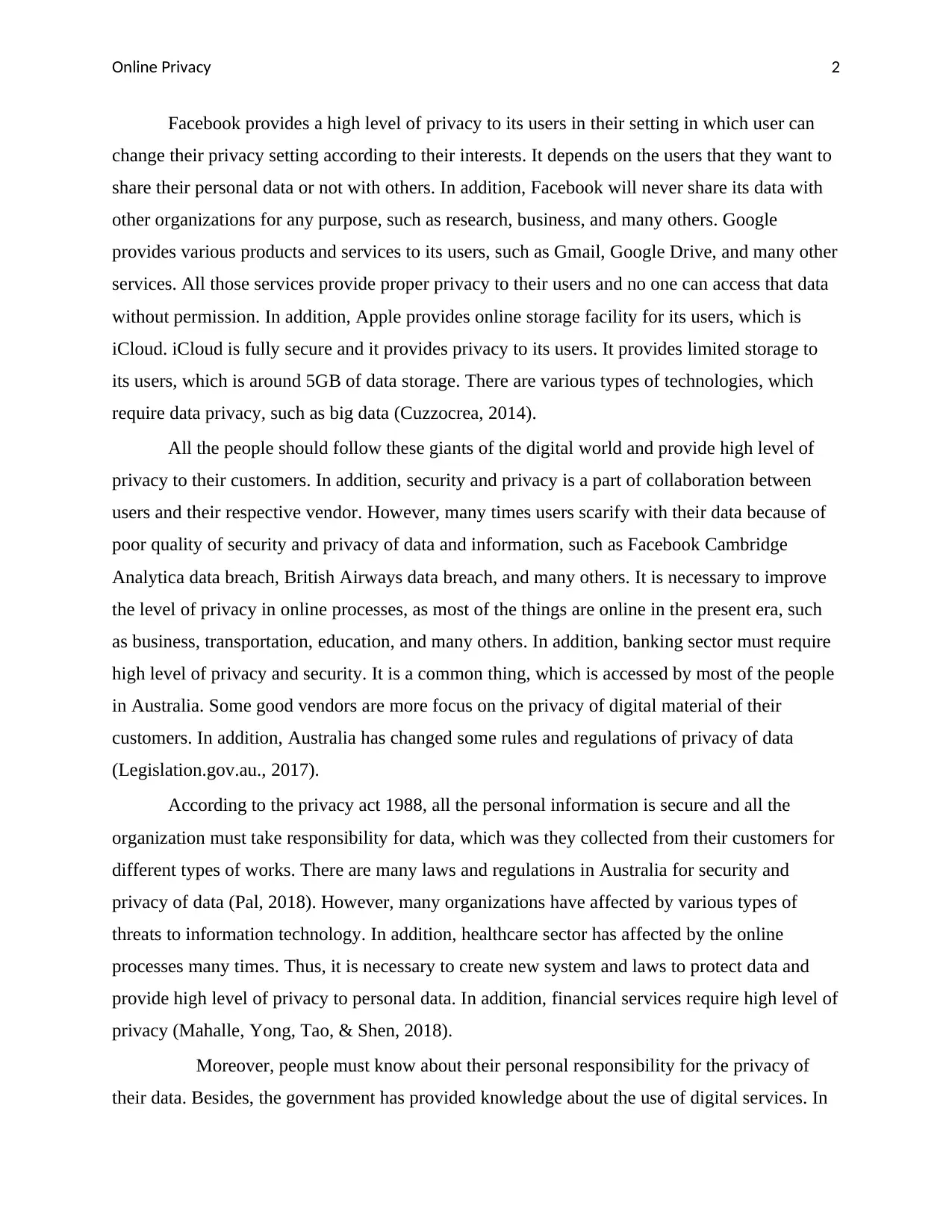
Online Privacy 2
Facebook provides a high level of privacy to its users in their setting in which user can
change their privacy setting according to their interests. It depends on the users that they want to
share their personal data or not with others. In addition, Facebook will never share its data with
other organizations for any purpose, such as research, business, and many others. Google
provides various products and services to its users, such as Gmail, Google Drive, and many other
services. All those services provide proper privacy to their users and no one can access that data
without permission. In addition, Apple provides online storage facility for its users, which is
iCloud. iCloud is fully secure and it provides privacy to its users. It provides limited storage to
its users, which is around 5GB of data storage. There are various types of technologies, which
require data privacy, such as big data (Cuzzocrea, 2014).
All the people should follow these giants of the digital world and provide high level of
privacy to their customers. In addition, security and privacy is a part of collaboration between
users and their respective vendor. However, many times users scarify with their data because of
poor quality of security and privacy of data and information, such as Facebook Cambridge
Analytica data breach, British Airways data breach, and many others. It is necessary to improve
the level of privacy in online processes, as most of the things are online in the present era, such
as business, transportation, education, and many others. In addition, banking sector must require
high level of privacy and security. It is a common thing, which is accessed by most of the people
in Australia. Some good vendors are more focus on the privacy of digital material of their
customers. In addition, Australia has changed some rules and regulations of privacy of data
(Legislation.gov.au., 2017).
According to the privacy act 1988, all the personal information is secure and all the
organization must take responsibility for data, which was they collected from their customers for
different types of works. There are many laws and regulations in Australia for security and
privacy of data (Pal, 2018). However, many organizations have affected by various types of
threats to information technology. In addition, healthcare sector has affected by the online
processes many times. Thus, it is necessary to create new system and laws to protect data and
provide high level of privacy to personal data. In addition, financial services require high level of
privacy (Mahalle, Yong, Tao, & Shen, 2018).
Moreover, people must know about their personal responsibility for the privacy of
their data. Besides, the government has provided knowledge about the use of digital services. In
Facebook provides a high level of privacy to its users in their setting in which user can
change their privacy setting according to their interests. It depends on the users that they want to
share their personal data or not with others. In addition, Facebook will never share its data with
other organizations for any purpose, such as research, business, and many others. Google
provides various products and services to its users, such as Gmail, Google Drive, and many other
services. All those services provide proper privacy to their users and no one can access that data
without permission. In addition, Apple provides online storage facility for its users, which is
iCloud. iCloud is fully secure and it provides privacy to its users. It provides limited storage to
its users, which is around 5GB of data storage. There are various types of technologies, which
require data privacy, such as big data (Cuzzocrea, 2014).
All the people should follow these giants of the digital world and provide high level of
privacy to their customers. In addition, security and privacy is a part of collaboration between
users and their respective vendor. However, many times users scarify with their data because of
poor quality of security and privacy of data and information, such as Facebook Cambridge
Analytica data breach, British Airways data breach, and many others. It is necessary to improve
the level of privacy in online processes, as most of the things are online in the present era, such
as business, transportation, education, and many others. In addition, banking sector must require
high level of privacy and security. It is a common thing, which is accessed by most of the people
in Australia. Some good vendors are more focus on the privacy of digital material of their
customers. In addition, Australia has changed some rules and regulations of privacy of data
(Legislation.gov.au., 2017).
According to the privacy act 1988, all the personal information is secure and all the
organization must take responsibility for data, which was they collected from their customers for
different types of works. There are many laws and regulations in Australia for security and
privacy of data (Pal, 2018). However, many organizations have affected by various types of
threats to information technology. In addition, healthcare sector has affected by the online
processes many times. Thus, it is necessary to create new system and laws to protect data and
provide high level of privacy to personal data. In addition, financial services require high level of
privacy (Mahalle, Yong, Tao, & Shen, 2018).
Moreover, people must know about their personal responsibility for the privacy of
their data. Besides, the government has provided knowledge about the use of digital services. In
⊘ This is a preview!⊘
Do you want full access?
Subscribe today to unlock all pages.

Trusted by 1+ million students worldwide
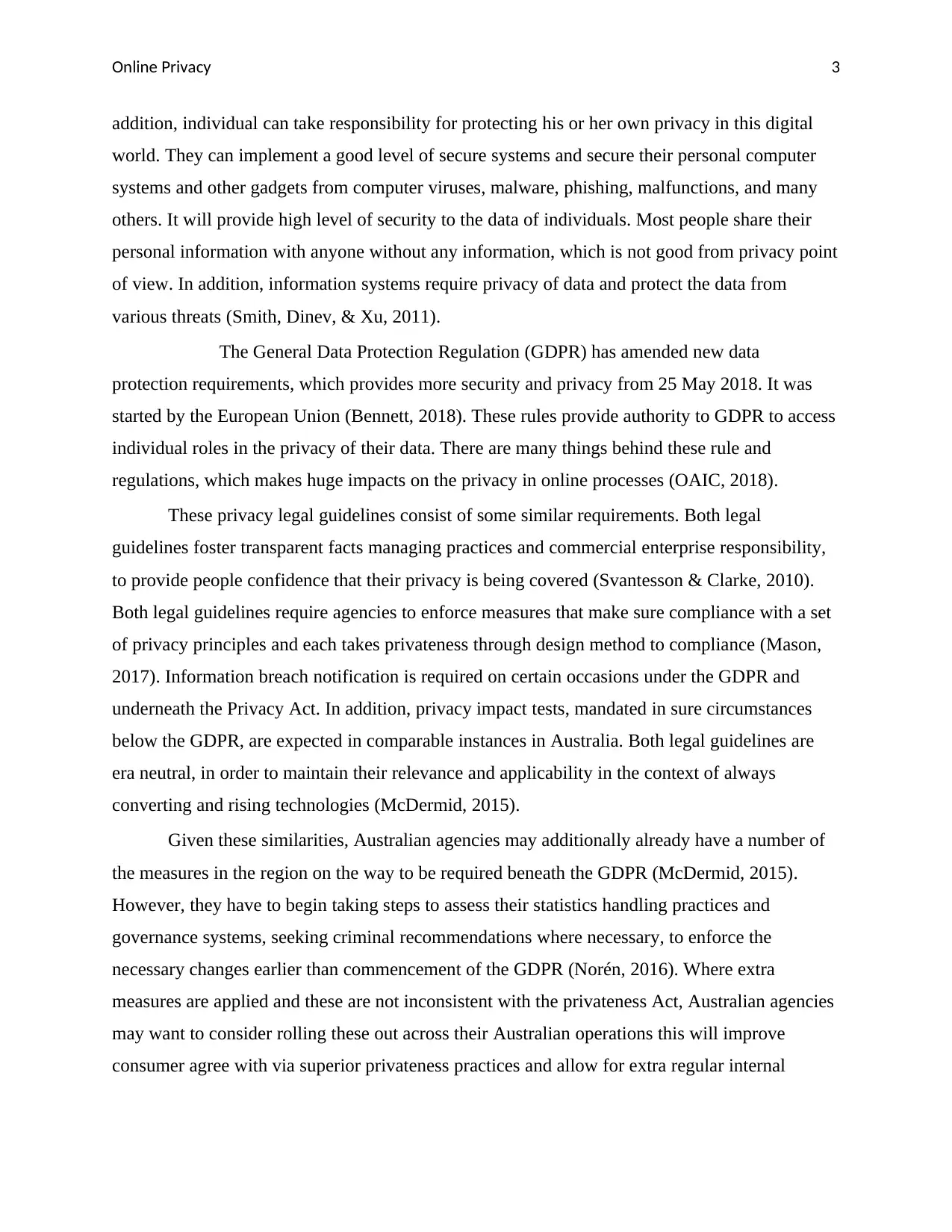
Online Privacy 3
addition, individual can take responsibility for protecting his or her own privacy in this digital
world. They can implement a good level of secure systems and secure their personal computer
systems and other gadgets from computer viruses, malware, phishing, malfunctions, and many
others. It will provide high level of security to the data of individuals. Most people share their
personal information with anyone without any information, which is not good from privacy point
of view. In addition, information systems require privacy of data and protect the data from
various threats (Smith, Dinev, & Xu, 2011).
The General Data Protection Regulation (GDPR) has amended new data
protection requirements, which provides more security and privacy from 25 May 2018. It was
started by the European Union (Bennett, 2018). These rules provide authority to GDPR to access
individual roles in the privacy of their data. There are many things behind these rule and
regulations, which makes huge impacts on the privacy in online processes (OAIC, 2018).
These privacy legal guidelines consist of some similar requirements. Both legal
guidelines foster transparent facts managing practices and commercial enterprise responsibility,
to provide people confidence that their privacy is being covered (Svantesson & Clarke, 2010).
Both legal guidelines require agencies to enforce measures that make sure compliance with a set
of privacy principles and each takes privateness through design method to compliance (Mason,
2017). Information breach notification is required on certain occasions under the GDPR and
underneath the Privacy Act. In addition, privacy impact tests, mandated in sure circumstances
below the GDPR, are expected in comparable instances in Australia. Both legal guidelines are
era neutral, in order to maintain their relevance and applicability in the context of always
converting and rising technologies (McDermid, 2015).
Given these similarities, Australian agencies may additionally already have a number of
the measures in the region on the way to be required beneath the GDPR (McDermid, 2015).
However, they have to begin taking steps to assess their statistics handling practices and
governance systems, seeking criminal recommendations where necessary, to enforce the
necessary changes earlier than commencement of the GDPR (Norén, 2016). Where extra
measures are applied and these are not inconsistent with the privateness Act, Australian agencies
may want to consider rolling these out across their Australian operations this will improve
consumer agree with via superior privateness practices and allow for extra regular internal
addition, individual can take responsibility for protecting his or her own privacy in this digital
world. They can implement a good level of secure systems and secure their personal computer
systems and other gadgets from computer viruses, malware, phishing, malfunctions, and many
others. It will provide high level of security to the data of individuals. Most people share their
personal information with anyone without any information, which is not good from privacy point
of view. In addition, information systems require privacy of data and protect the data from
various threats (Smith, Dinev, & Xu, 2011).
The General Data Protection Regulation (GDPR) has amended new data
protection requirements, which provides more security and privacy from 25 May 2018. It was
started by the European Union (Bennett, 2018). These rules provide authority to GDPR to access
individual roles in the privacy of their data. There are many things behind these rule and
regulations, which makes huge impacts on the privacy in online processes (OAIC, 2018).
These privacy legal guidelines consist of some similar requirements. Both legal
guidelines foster transparent facts managing practices and commercial enterprise responsibility,
to provide people confidence that their privacy is being covered (Svantesson & Clarke, 2010).
Both legal guidelines require agencies to enforce measures that make sure compliance with a set
of privacy principles and each takes privateness through design method to compliance (Mason,
2017). Information breach notification is required on certain occasions under the GDPR and
underneath the Privacy Act. In addition, privacy impact tests, mandated in sure circumstances
below the GDPR, are expected in comparable instances in Australia. Both legal guidelines are
era neutral, in order to maintain their relevance and applicability in the context of always
converting and rising technologies (McDermid, 2015).
Given these similarities, Australian agencies may additionally already have a number of
the measures in the region on the way to be required beneath the GDPR (McDermid, 2015).
However, they have to begin taking steps to assess their statistics handling practices and
governance systems, seeking criminal recommendations where necessary, to enforce the
necessary changes earlier than commencement of the GDPR (Norén, 2016). Where extra
measures are applied and these are not inconsistent with the privateness Act, Australian agencies
may want to consider rolling these out across their Australian operations this will improve
consumer agree with via superior privateness practices and allow for extra regular internal
Paraphrase This Document
Need a fresh take? Get an instant paraphrase of this document with our AI Paraphraser
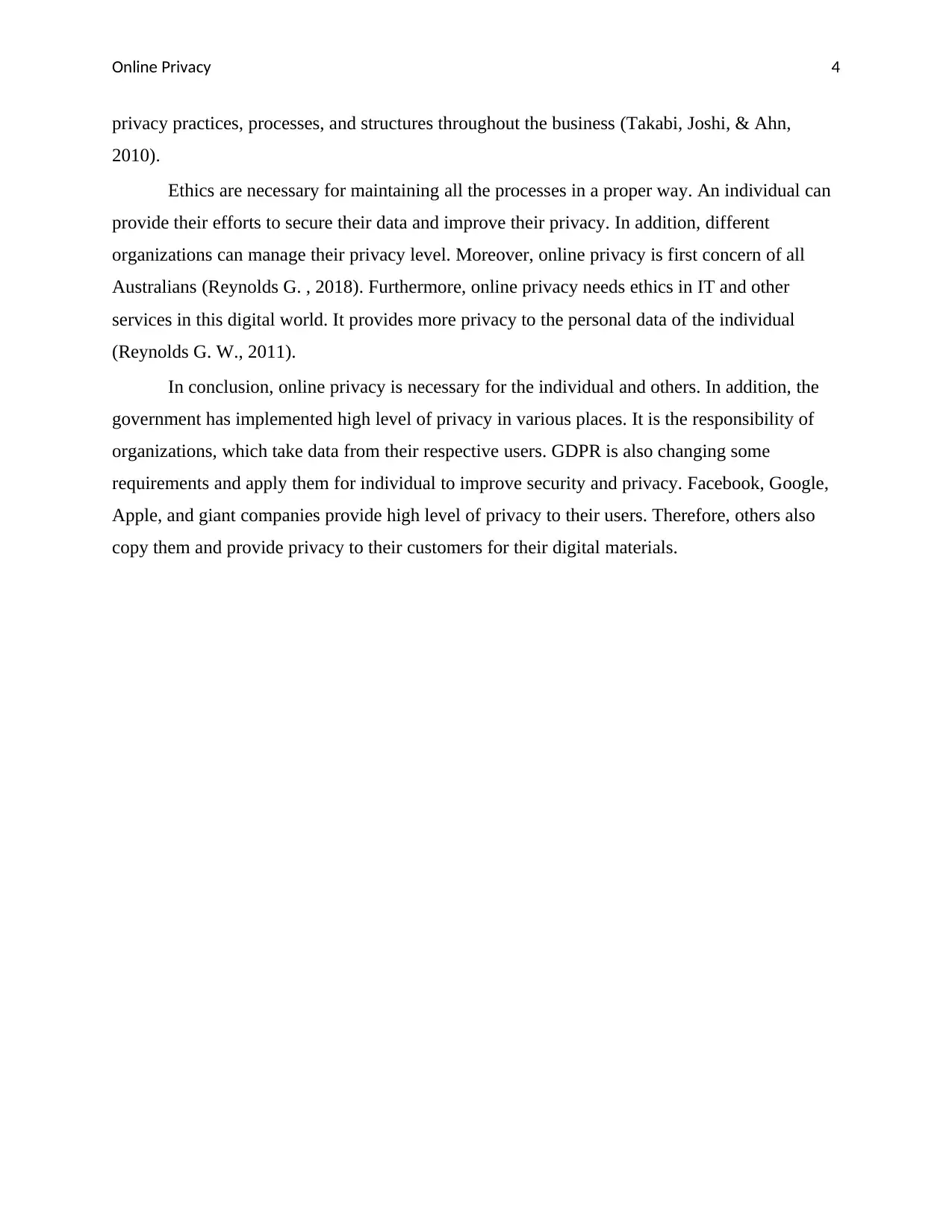
Online Privacy 4
privacy practices, processes, and structures throughout the business (Takabi, Joshi, & Ahn,
2010).
Ethics are necessary for maintaining all the processes in a proper way. An individual can
provide their efforts to secure their data and improve their privacy. In addition, different
organizations can manage their privacy level. Moreover, online privacy is first concern of all
Australians (Reynolds G. , 2018). Furthermore, online privacy needs ethics in IT and other
services in this digital world. It provides more privacy to the personal data of the individual
(Reynolds G. W., 2011).
In conclusion, online privacy is necessary for the individual and others. In addition, the
government has implemented high level of privacy in various places. It is the responsibility of
organizations, which take data from their respective users. GDPR is also changing some
requirements and apply them for individual to improve security and privacy. Facebook, Google,
Apple, and giant companies provide high level of privacy to their users. Therefore, others also
copy them and provide privacy to their customers for their digital materials.
privacy practices, processes, and structures throughout the business (Takabi, Joshi, & Ahn,
2010).
Ethics are necessary for maintaining all the processes in a proper way. An individual can
provide their efforts to secure their data and improve their privacy. In addition, different
organizations can manage their privacy level. Moreover, online privacy is first concern of all
Australians (Reynolds G. , 2018). Furthermore, online privacy needs ethics in IT and other
services in this digital world. It provides more privacy to the personal data of the individual
(Reynolds G. W., 2011).
In conclusion, online privacy is necessary for the individual and others. In addition, the
government has implemented high level of privacy in various places. It is the responsibility of
organizations, which take data from their respective users. GDPR is also changing some
requirements and apply them for individual to improve security and privacy. Facebook, Google,
Apple, and giant companies provide high level of privacy to their users. Therefore, others also
copy them and provide privacy to their customers for their digital materials.
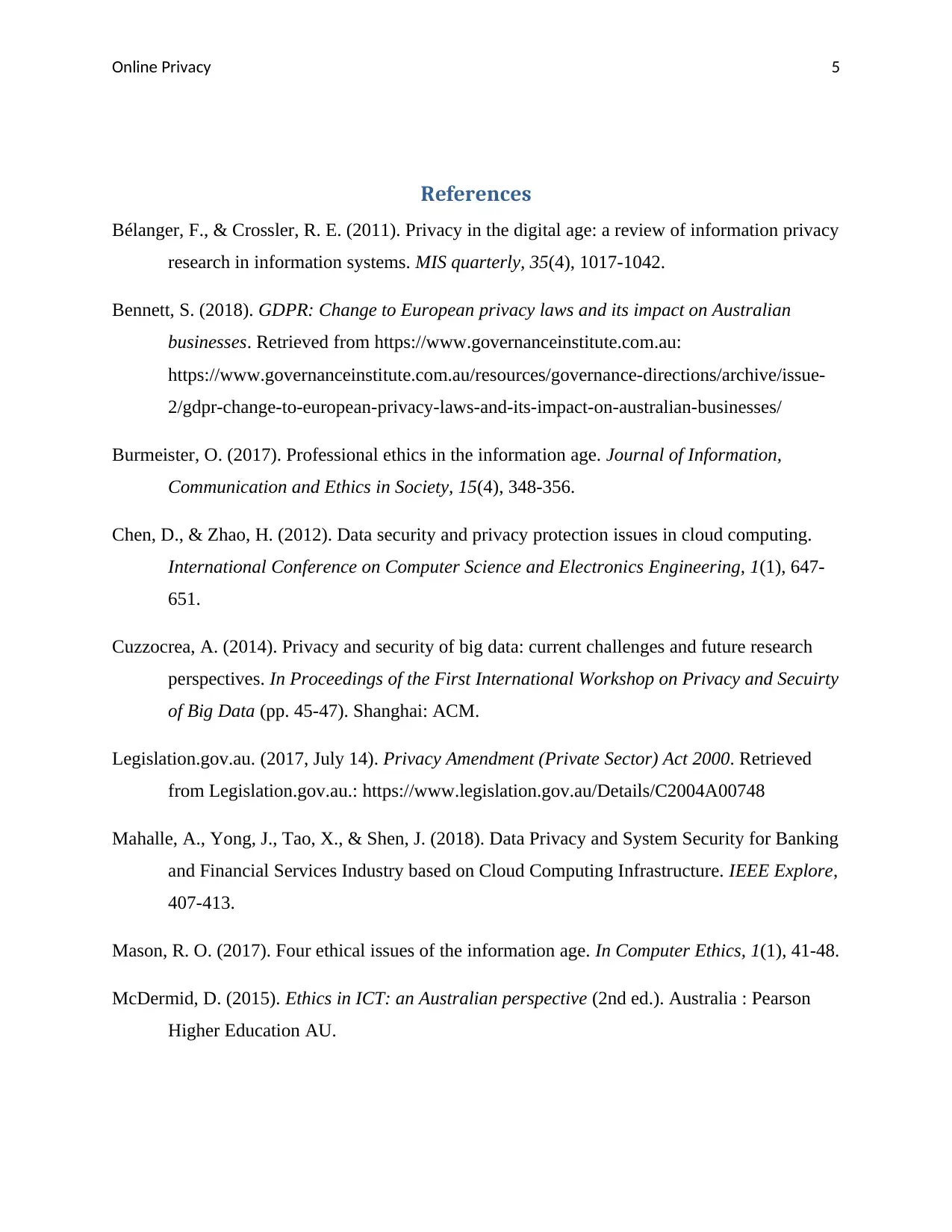
Online Privacy 5
References
Bélanger, F., & Crossler, R. E. (2011). Privacy in the digital age: a review of information privacy
research in information systems. MIS quarterly, 35(4), 1017-1042.
Bennett, S. (2018). GDPR: Change to European privacy laws and its impact on Australian
businesses. Retrieved from https://www.governanceinstitute.com.au:
https://www.governanceinstitute.com.au/resources/governance-directions/archive/issue-
2/gdpr-change-to-european-privacy-laws-and-its-impact-on-australian-businesses/
Burmeister, O. (2017). Professional ethics in the information age. Journal of Information,
Communication and Ethics in Society, 15(4), 348-356.
Chen, D., & Zhao, H. (2012). Data security and privacy protection issues in cloud computing.
International Conference on Computer Science and Electronics Engineering, 1(1), 647-
651.
Cuzzocrea, A. (2014). Privacy and security of big data: current challenges and future research
perspectives. In Proceedings of the First International Workshop on Privacy and Secuirty
of Big Data (pp. 45-47). Shanghai: ACM.
Legislation.gov.au. (2017, July 14). Privacy Amendment (Private Sector) Act 2000. Retrieved
from Legislation.gov.au.: https://www.legislation.gov.au/Details/C2004A00748
Mahalle, A., Yong, J., Tao, X., & Shen, J. (2018). Data Privacy and System Security for Banking
and Financial Services Industry based on Cloud Computing Infrastructure. IEEE Explore,
407-413.
Mason, R. O. (2017). Four ethical issues of the information age. In Computer Ethics, 1(1), 41-48.
McDermid, D. (2015). Ethics in ICT: an Australian perspective (2nd ed.). Australia : Pearson
Higher Education AU.
References
Bélanger, F., & Crossler, R. E. (2011). Privacy in the digital age: a review of information privacy
research in information systems. MIS quarterly, 35(4), 1017-1042.
Bennett, S. (2018). GDPR: Change to European privacy laws and its impact on Australian
businesses. Retrieved from https://www.governanceinstitute.com.au:
https://www.governanceinstitute.com.au/resources/governance-directions/archive/issue-
2/gdpr-change-to-european-privacy-laws-and-its-impact-on-australian-businesses/
Burmeister, O. (2017). Professional ethics in the information age. Journal of Information,
Communication and Ethics in Society, 15(4), 348-356.
Chen, D., & Zhao, H. (2012). Data security and privacy protection issues in cloud computing.
International Conference on Computer Science and Electronics Engineering, 1(1), 647-
651.
Cuzzocrea, A. (2014). Privacy and security of big data: current challenges and future research
perspectives. In Proceedings of the First International Workshop on Privacy and Secuirty
of Big Data (pp. 45-47). Shanghai: ACM.
Legislation.gov.au. (2017, July 14). Privacy Amendment (Private Sector) Act 2000. Retrieved
from Legislation.gov.au.: https://www.legislation.gov.au/Details/C2004A00748
Mahalle, A., Yong, J., Tao, X., & Shen, J. (2018). Data Privacy and System Security for Banking
and Financial Services Industry based on Cloud Computing Infrastructure. IEEE Explore,
407-413.
Mason, R. O. (2017). Four ethical issues of the information age. In Computer Ethics, 1(1), 41-48.
McDermid, D. (2015). Ethics in ICT: an Australian perspective (2nd ed.). Australia : Pearson
Higher Education AU.
⊘ This is a preview!⊘
Do you want full access?
Subscribe today to unlock all pages.

Trusted by 1+ million students worldwide
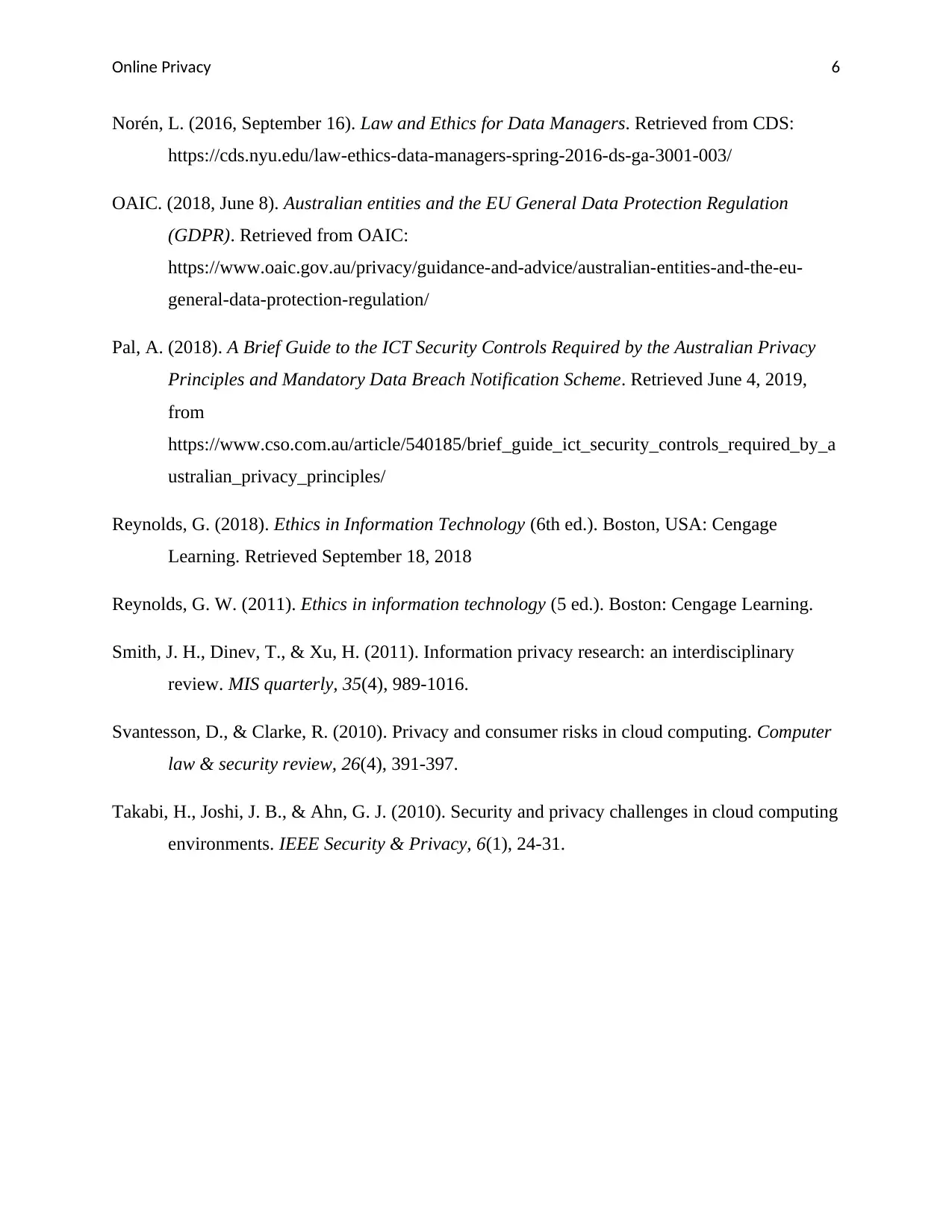
Online Privacy 6
Norén, L. (2016, September 16). Law and Ethics for Data Managers. Retrieved from CDS:
https://cds.nyu.edu/law-ethics-data-managers-spring-2016-ds-ga-3001-003/
OAIC. (2018, June 8). Australian entities and the EU General Data Protection Regulation
(GDPR). Retrieved from OAIC:
https://www.oaic.gov.au/privacy/guidance-and-advice/australian-entities-and-the-eu-
general-data-protection-regulation/
Pal, A. (2018). A Brief Guide to the ICT Security Controls Required by the Australian Privacy
Principles and Mandatory Data Breach Notification Scheme. Retrieved June 4, 2019,
from
https://www.cso.com.au/article/540185/brief_guide_ict_security_controls_required_by_a
ustralian_privacy_principles/
Reynolds, G. (2018). Ethics in Information Technology (6th ed.). Boston, USA: Cengage
Learning. Retrieved September 18, 2018
Reynolds, G. W. (2011). Ethics in information technology (5 ed.). Boston: Cengage Learning.
Smith, J. H., Dinev, T., & Xu, H. (2011). Information privacy research: an interdisciplinary
review. MIS quarterly, 35(4), 989-1016.
Svantesson, D., & Clarke, R. (2010). Privacy and consumer risks in cloud computing. Computer
law & security review, 26(4), 391-397.
Takabi, H., Joshi, J. B., & Ahn, G. J. (2010). Security and privacy challenges in cloud computing
environments. IEEE Security & Privacy, 6(1), 24-31.
Norén, L. (2016, September 16). Law and Ethics for Data Managers. Retrieved from CDS:
https://cds.nyu.edu/law-ethics-data-managers-spring-2016-ds-ga-3001-003/
OAIC. (2018, June 8). Australian entities and the EU General Data Protection Regulation
(GDPR). Retrieved from OAIC:
https://www.oaic.gov.au/privacy/guidance-and-advice/australian-entities-and-the-eu-
general-data-protection-regulation/
Pal, A. (2018). A Brief Guide to the ICT Security Controls Required by the Australian Privacy
Principles and Mandatory Data Breach Notification Scheme. Retrieved June 4, 2019,
from
https://www.cso.com.au/article/540185/brief_guide_ict_security_controls_required_by_a
ustralian_privacy_principles/
Reynolds, G. (2018). Ethics in Information Technology (6th ed.). Boston, USA: Cengage
Learning. Retrieved September 18, 2018
Reynolds, G. W. (2011). Ethics in information technology (5 ed.). Boston: Cengage Learning.
Smith, J. H., Dinev, T., & Xu, H. (2011). Information privacy research: an interdisciplinary
review. MIS quarterly, 35(4), 989-1016.
Svantesson, D., & Clarke, R. (2010). Privacy and consumer risks in cloud computing. Computer
law & security review, 26(4), 391-397.
Takabi, H., Joshi, J. B., & Ahn, G. J. (2010). Security and privacy challenges in cloud computing
environments. IEEE Security & Privacy, 6(1), 24-31.
Paraphrase This Document
Need a fresh take? Get an instant paraphrase of this document with our AI Paraphraser

Online Privacy 7
1 out of 8
Related Documents
Your All-in-One AI-Powered Toolkit for Academic Success.
+13062052269
info@desklib.com
Available 24*7 on WhatsApp / Email
![[object Object]](/_next/static/media/star-bottom.7253800d.svg)
Unlock your academic potential
Copyright © 2020–2026 A2Z Services. All Rights Reserved. Developed and managed by ZUCOL.



